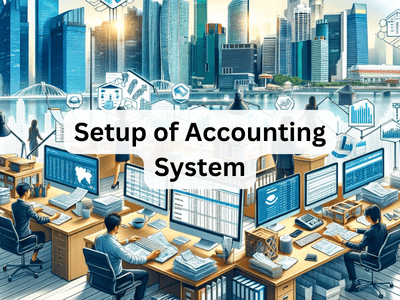This post is also available in:
![]() 简体中文 (Chinese (Simplified))
简体中文 (Chinese (Simplified))
Setup of Accounting System Services in Singapore
Package Fee for Setup of Accounting System
| Package Available | Fee (SGD) |
| Setup of Accounting System | From $400 (W/GST $436) |
 So you’re ready to start using a computerized accounting program! Before you can begin creating invoices and writing checks, you need to create a company file with accurate vendor and customer balances, a complete list of products and services sold, and all the necessary financial account balances. Sound challenging? Well, that’s because it is. Yet, once you set up your accounting system, you can then realize all the benefits of accounting software: increased efficiency, ability to track, analyze and improve your financial health, and the opportunity to add services such as payroll and credit card processing.
So you’re ready to start using a computerized accounting program! Before you can begin creating invoices and writing checks, you need to create a company file with accurate vendor and customer balances, a complete list of products and services sold, and all the necessary financial account balances. Sound challenging? Well, that’s because it is. Yet, once you set up your accounting system, you can then realize all the benefits of accounting software: increased efficiency, ability to track, analyze and improve your financial health, and the opportunity to add services such as payroll and credit card processing.
How to Set Up a Small Business Accounting System
Accumulate Financial Documents
- Keep all documents relating to your business including invoices, bills, bank statements, receipts, government documentation and assessments.
- When in doubt about the relevance of document to your business, hold on to them and ask your accountant (or someone else who can help) at a later date.
- Invest in a stamp that indicates the received date of the documents.
Create Filing System for Documents
- Use file folders and labels to organize financial documents
- Maintain bank statements, customer invoices, vendor bills, government assessments etc. in separate files
- Investing in colour coded file folders can greatly facilitate file retrieval
- File regularly to avoid scrambling at the end of the year
- Maintain separate folders for outstanding invoices, bills and other documents which require follow up.
Determine Accounting Requirements
- Review volume of transactions and complexity of business as well as your budget and time constraints.
- Depending on your requirements either hire a bookkeeper (full or part time), do it yourself or outsource to a third party
- Usually a good idea to have access to a professional accountant to help out with setup of accounting system, and ongoing questions as well as financial reporting and analysis and tax preparation.
Select Accounting Software
- Accounting requirements i.e. whether you hire a bookkeeper or DIY will determine if you need software.
- MYOB is good for many small businesses and freelancers. Speak to an accountant if unsure
- Free software also available , although functionality is limited
- If doing it yourself, select software that is user friendly. Many small business software have free trials.
Enter Financial Transactions into Accounting Software
- Important to enter transactions on a timely basis including customer invoices, vendor bills, deposits and cheques.
- Reconcile bank statements monthly to track balances and reduce potential errors
- Month end adjustments like depreciation, foreign exchange, accruals etc. help improve accuracy and reliability of financial statements, but can be done by accountant at year end.
Generate and Analyze Reports
- Accounting software will generate reports based on data entered. Review Accounts Receivable and Aging Reports, accounts payable to vendors, inventory balances etc.
- Financial statements can be generated monthly reflecting Profit and loss of the business as well as Balance Sheet.
- Analysis of financial statements can help improve sales, reduce expenses and ensure that customer balances are being collected and loan covenants are being met.
More information about the Accounting Software, please visit IRAS’ Accounting Software Register
Paying a firm like 3E Accounting to correctly set up an accounting system upfront is a cheap investment compared to what it will cost you to fix your accounting problems later on. Make the investment and call us today!


